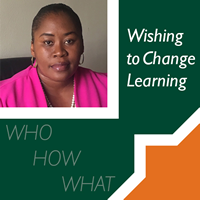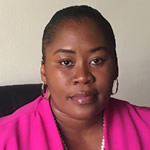Wishing to Change Learning: Who, ¿Cómo, and What

![]() “If you knew better, you would do better.” – TD Jakes
“If you knew better, you would do better.” – TD Jakes
The Internet has expanded knowledge enormously. People can learn how to crochet, raise a kitten, code, and how to take care of a baby from the comfort of home. For the first time in human history we can get the information we need, when we need it, and at very little cost. But many people still struggle, especially those who are older, femenino, pobres, or have disabilities. Many times they can’t access the information they need in ways that are useful to them. Often the resources available require a guide or a trainer to help them to get the best out of the information.
My whole life has been spent as a student or a teacher or both. I have spent decades engaging with material, lessons, lectures and tests in formal and informal settings. I have also had the opportunity to share my knowledge with others; to pass the baton. And in all cases, I have found that learning is influenced by the teacher. Formal institutions are often strict about their curriculum and attendance but less attention is placed on supporting teachers to optimize the delivery of knowledge and information while they work.
If I could change one thing about learning, it would be the way teachers are supported. Instead of selecting teachers simply because of their areas of expertise and leaving them on their own to figure out the best way to share their knowledge, I would institute processes and systems to empower teachers to teach others. Some institutions do this already, for example through teaching fellowships like Teach for Nigeria, which supports teachers to reach those who need help most. But there is more that can be done and that needs to be done to reach vulnerable populations.
Good learning modalities need to be identified and included in trainings, and the teachers who master them should be acknowledged and rewarded. Teachers can make a huge difference in the lives of learners. Sin embargo, not only are they not often supported to teach well, but most trainers and teachers are underpaid, underappreciated and under-rewarded too. This needs to change.
If I could change another thing about learning, it would be how we learn and how much fun learning can be. Learning is lifelong for most people, we need to make it as pleasant and useful as possible. Traditional methods focused on what can be read and written are insufficient for the kind of learning we need now. Today’s methods must cater to all learning styles: spatial, auditory, kinesthetic, individual, social, logical, linguistic and others. In an era of massive amounts of information and dwindling attention spans, we must discard teaching methods that are outdated and cumbersome. We have to find fresh, meaningful, and fun ways to engage with the next generation of learners.
If I had yet another opportunity, I would change our content. We must tailor content to current challenges and find relevant ‘how to’ solutions. Some of the most popular Google searches are the ‘How to’ searches. When learners need to know how to solve a problem they are motivated and focused. These are the learning opportunities we must capitalize on. Teaching then is like leading a thirsty horse to a stream. Nowadays, students and learners are setting aside ornamental knowledge. They want knowledge that answers questions, provides solutions, and helps pay the bills. And teaching should give them the most applicable, useful, user-friendly experience possible.
When our teachers are supported, they can be passionate. When learning is tailored to learners, it can be retained. When content is applicable, it can be applied. Students and other learners will embrace their lessons and we will have a smarter, stronger global community where knowledge can be discovered and explored. Everyday I try to learn something new and take cues from teachers that inspire and challenge me. Hopefully, this will translate into change in my own teaching practice. What about you?
Sobre el Autor:
 Dr. Nsisong Bassey Asanga is an physician, writer, epidemiologist, and social entrepreneur. She has over a decade of experience in clinical medicine, teaching and mentoring. She is an alumna of the Nigerian Field Epidemiology Training Program (NFELTP), and the MSH Leadership Development Program (PLD). She volunteers with Prohealth International, ECEWS and the African Union. She has a Bachelor’s Degree in Medicine and Surgery and a Master’s in Public Health.
Dr. Nsisong Bassey Asanga is an physician, writer, epidemiologist, and social entrepreneur. She has over a decade of experience in clinical medicine, teaching and mentoring. She is an alumna of the Nigerian Field Epidemiology Training Program (NFELTP), and the MSH Leadership Development Program (PLD). She volunteers with Prohealth International, ECEWS and the African Union. She has a Bachelor’s Degree in Medicine and Surgery and a Master’s in Public Health.




this is a tremendously rich information that need to be adjusted in any environmental context, especially in Africa where the Gov needs to invest more money than it is the case in order to enhance both the education and the health systems.
Thank you Antoine, the need for change in African education budgets and systems is enormous.
“We must tailor content to current challenges and find relevant ‘how to’ solutions.”
Yes! I couldn’t agree more. More often I’m finding curriculum that is focused on showing the ‘what’ and missing the ‘how.’ This point makes me think about Minerva Schools at KGI, which tries to tackle this very issue and disrupt the way we approach education. In one of their interviews, the founders said:
“In what we teach, we are classical in our approach, even though we’re [also] modern and progressive in the way we teach. Por ejemplo, if you think about the purpose of a liberal arts education, or what the great American universities purport to teach, they will say ‘We teach you how to think critically, how to problem-solve, how to think about the way the world works and to be global, and how to communicate effectively. When you actually look at how universities attempt to do it, they basically teach you academic subject matter and they hope you pick up all of the other stuff by accident.”
Granted, they’re making a comparison to American universities, but I feel that their approach is very applicable to your point. It’s so important to provide the next generation of students not only with a toolbox, but a guide on using those tools, and a clear map of what issues we are currently facing. If we want the next generation to change the world, let’s show them the world!
In case anyone is curious, here’s: https://www.minerva.kgi.edu/
Thank you Santita, I couldn’t agree more. We have to show them the way and give them the tools, it is the only way.